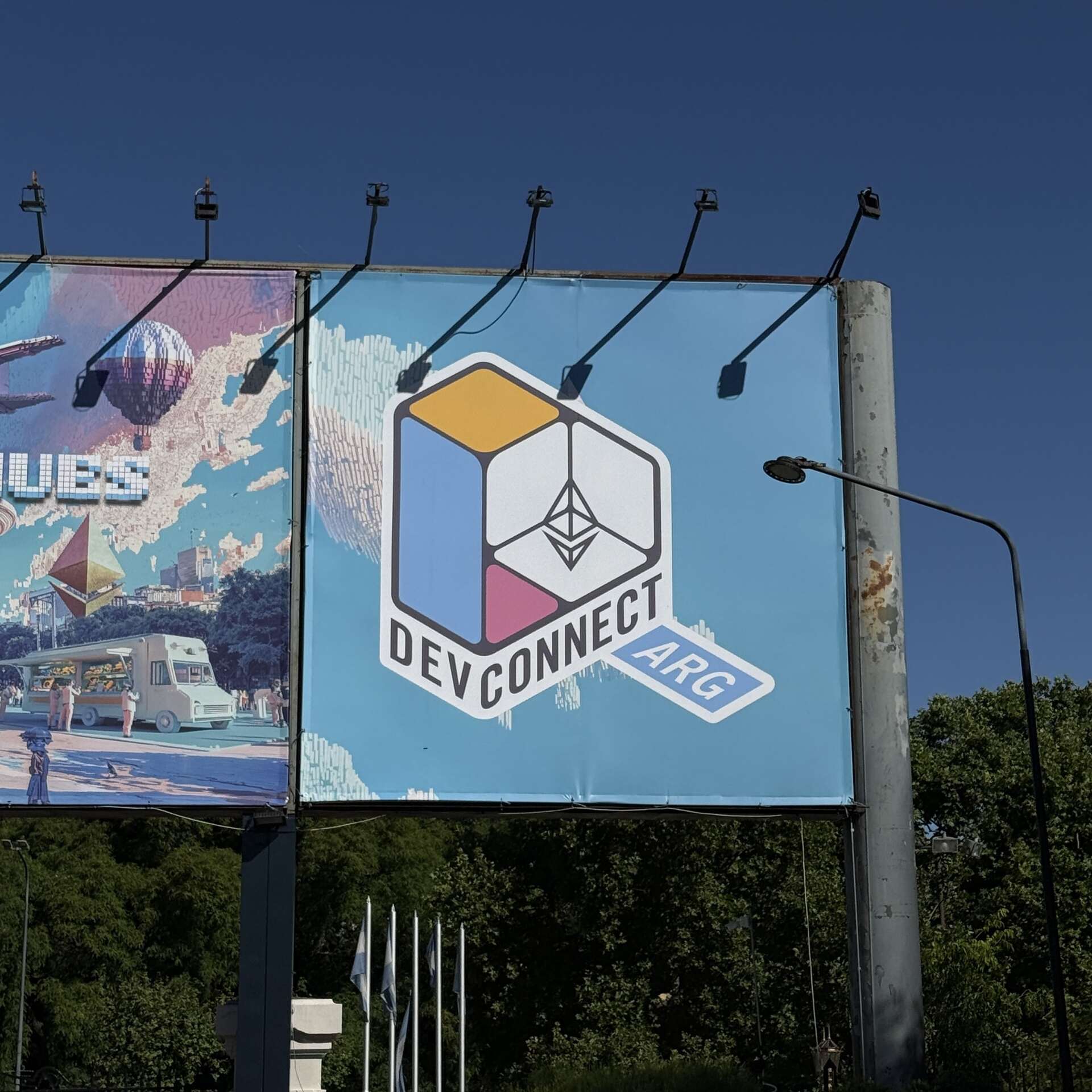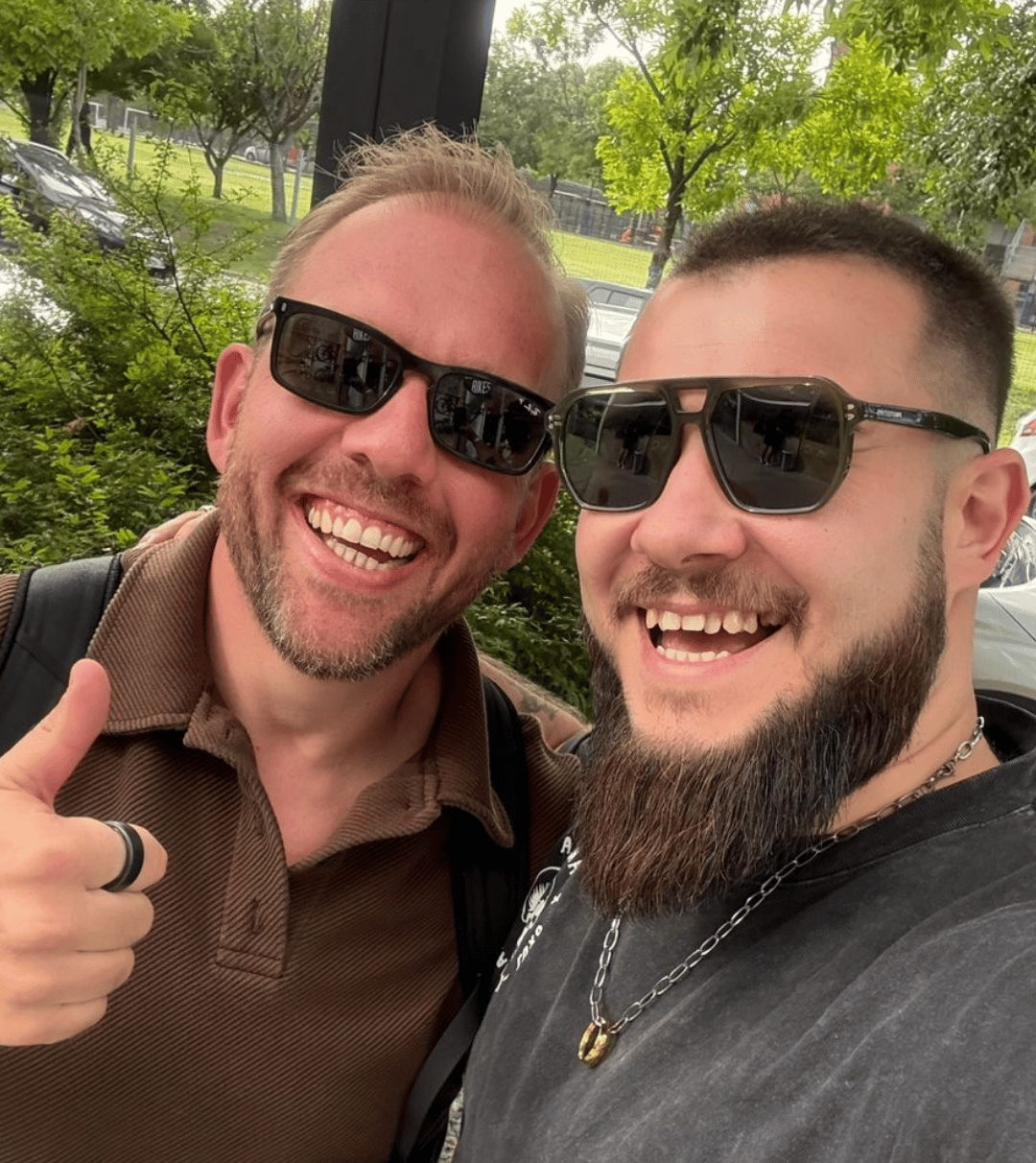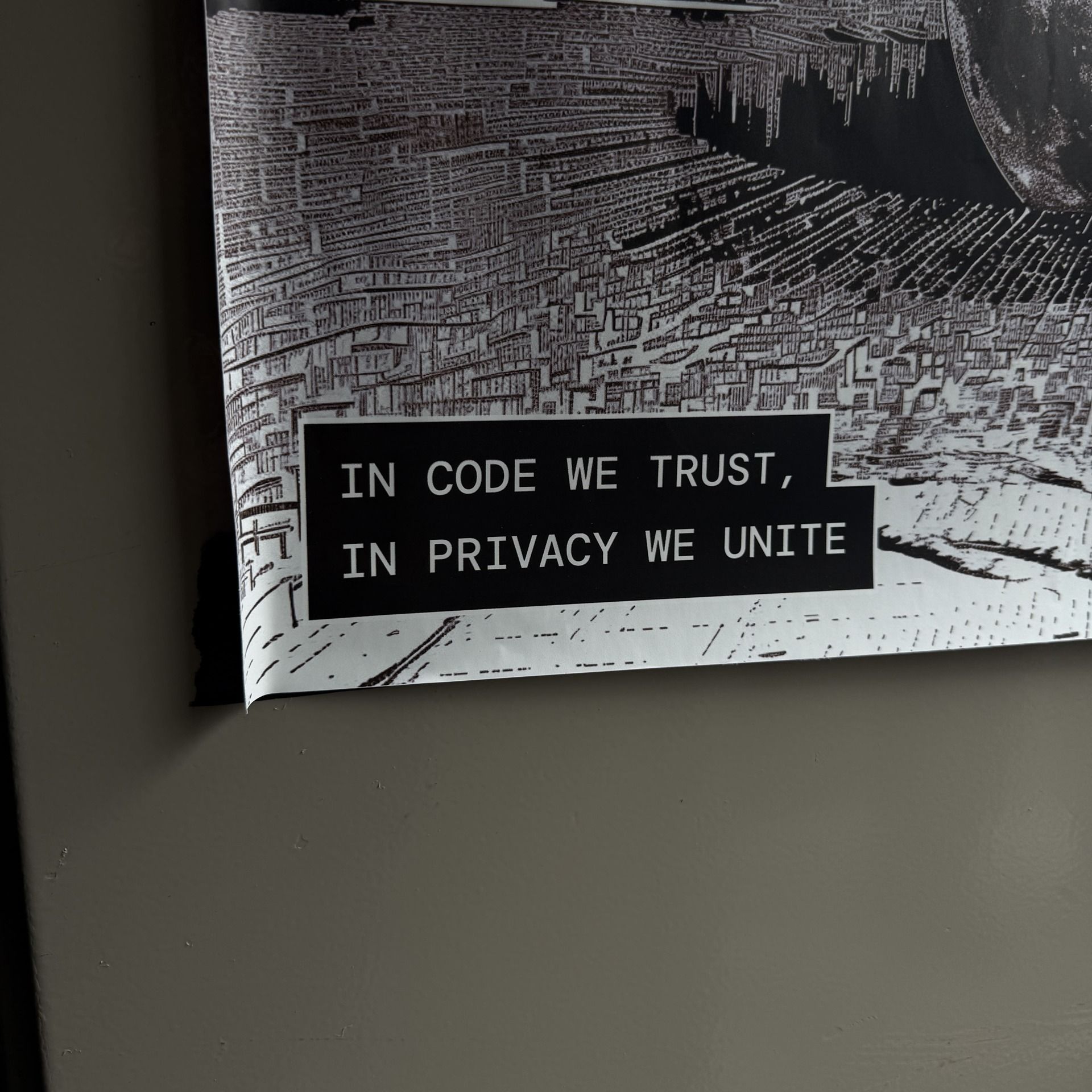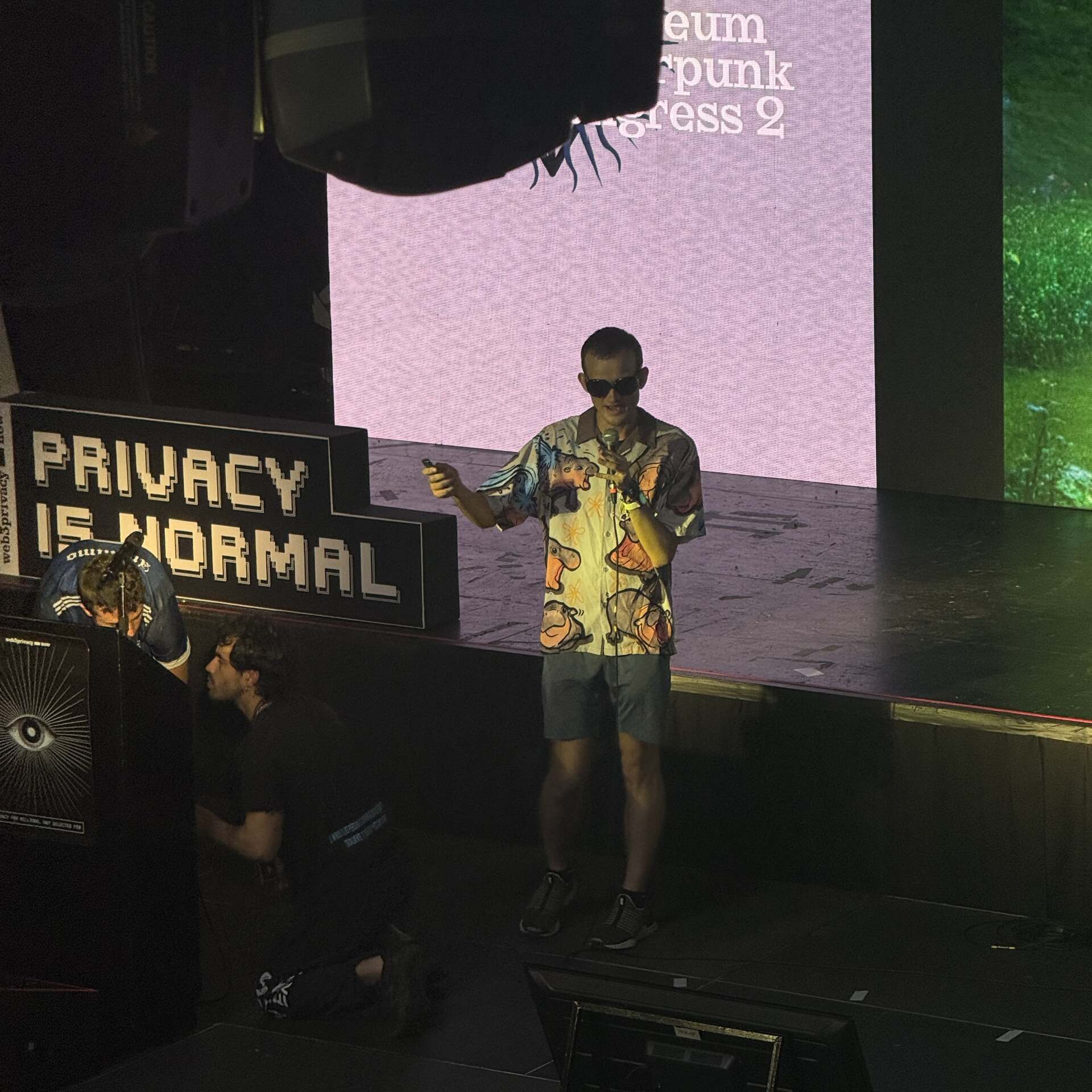- Funs Jacobs
- Posts
- If You Care About Freedom, You Should Care About This
If You Care About Freedom, You Should Care About This
From hyperinflation to privacy debates, Devconnect 2025 revealed why decentralized systems matter more than ever.
Buenos Aires and the Real Purpose of Blockchain
I am writing this from Buenos Aires, Argentina, as I am here for about 9 days to visit the Devconnect Conference, the world’s largest Ethereum minded event. My goal of this week is to share with you some of the things I saw, insights or any other thoughts or inspiration.
First and foremost, what is Devconnect?
Devconnect is a week-long, city-wide gathering organized by the Ethereum Foundation. It isn’t a single conference. It’s a curated constellation of independent events, workshops, technical deep dives, meetups, research sessions, and community gatherings spread across the host city.
The core idea is simple. Bring the entire Ethereum ecosystem together in one place and give builders the space to learn, coordinate, and push the protocol forward. No spectacle. No flashy expo halls. No corporate noise. Devconnect is intentionally designed for depth over hype.
Most of the sessions are organized by teams within the community. Researchers, protocol engineers, privacy advocates, client teams, L2 builders, application founders, and open-source contributors. Each event focuses on a specific domain, from zero-knowledge rollups to decentralized identity, from validator economics to agent standards like ERC-8004.
In practice, Devconnect feels more like an ecosystem retreat than a traditional conference. The agenda is decentralized. The people are hands-on. And the conversations are centered on long-term problems that actually matter for Ethereum’s future. It’s where you see the culture of the chain reflected in real life.

Ethereum? What are you talking about Funs?
Ethereum is a decentralized computing platform that allows anyone to build applications that run on a global network instead of on servers controlled by a single company. At its core, Ethereum is an open, programmable blockchain. It gives developers the ability to create smart contracts, applications, and economic systems that cannot be altered or shut down by a central authority.
To understand why it exists, you have to understand the story behind its creator.
Vitalik Buterin was a teenager when he first became active in online gaming, mathematics, and cryptography forums. In 2010 he discovered Bitcoin and became fascinated by the idea of money operating without a government or company in control. He began writing for Bitcoin Magazine soon after and quickly became one of the most well-known young thinkers in the space.
But there is a specific moment that shaped his philosophy around decentralization. When he was around 15 years old, he played World of Warcraft. One day Blizzard changed the properties of a spell for the Warlock class. Vitalik’s character depended on that spell, and overnight his build was weakened. He has written about this moment publicly.
“I happily played World of Warcraft during 2007-2010, but one day Blizzard removed the damage component from my beloved warlock's Siphon Life spell. I cried myself to sleep, and on that day I realized what horrors centralized services can bring. I soon decided to quit.”
It made him realize how much power centralized platforms have over the digital things people care about. That experience was one of the early sparks behind his belief in user ownership and systems that cannot be arbitrarily altered from above.
Bitcoin was the first proof that decentralized digital ownership could work. Vitalik believed the internet needed a general-purpose, programmable blockchain. A system where developers could build applications that run on a network, not a company. Something open, neutral, and resistant to unilateral control. In late 2013, at just 19 years old, he wrote the Ethereum whitepaper proposing exactly that.
The goal of Ethereum is straightforward. Create an open, neutral, censorship-resistant base layer for the internet. A foundation where applications, assets, and communities can operate without relying on trust in a single company or intermediary. Over the past decade, Ethereum has grown from an idea in a whitepaper to the world’s largest decentralized application ecosystem. It now supports thousands of developers and millions of users, all contributing to a vision of a more open digital world.
Let’s look at some numbers
Market capitalization
Ethereum is the second-largest blockchain in the world with a market cap fluctuating around USD 350–450 billion, depending on market conditions.
Total value secured on the network
Across smart contracts, protocols, and applications, Ethereum secures well over USD 100 billion in value.
Total Value Locked (TVL) in DeFi
Ethereum holds the largest share of the decentralized finance ecosystem with roughly USD 50–70 billion locked in DeFi (Decentralized Finance) protocols.
Global user reach
More than 200 million unique addresses exist across the Ethereum ecosystem.
Daily active users
Depending on the day, the Ethereum ecosystem sees 1–2 million daily active addresses.
Daily transactions
The entire Ethereum ecosystem combined processes roughly 12 to 20 million transactions per day.
Smart contracts deployed
More than 4 million smart contracts have been deployed on Ethereum to date.
Economic activity
Ethereum processes over USD 1 trillion in transaction value annually, depending on market conditions.
It is worth noting that Vitalik, together with a small group of early developers, launched Ethereum. But he does not “control” the network in any meaningful way. He is Ethereum’s spiritual leader, not its ruler or CEO. The protocol runs on thousands of independent nodes that no single person can change. Exactly how he wanted it to become, as in this form nobody could have changed his beloved game if it would have been built on Ethereum rails.
Now you have a bit more context of what this week is all about, let me share some of my personal experiences here being in Buenos Aires and at this event (and all its side events).
Buenos Aires, the Crypto hub of the world?
It makes total sense why the Ethereum Devconnect event landed in Buenos Aires (after Istanbul in 2023 and Amsterdam in 2022). For the people that don’t know, Argentina is one of the countries where crypto is used most in daily life. The adoption numbers here are off the charts. I heard about this many times before, but now I could actually experience it. Crypto feels normal here, it’s in many different places.

The code of the first ever registered Bitcoin block.
This did not happen by accident, this not happened because of memecoins or “get rich quick” schemes. This happened out of pure necessity. Argentinians utilize crypto exactly for what it is meant, and that is to make their own lives better, to give them a way out of the system that they were (until blockchain) born into, they use it to protect themselves.
Argentina has lived through something most people only read about. Hyperinflation is not a headline here but a lived experience. During one of the presentations I visited, the CEO of Lemon, Argentina’s most widely used crypto app, showed a slide that said the Argentinian Peso lost roughly 92 percent of its purchasing power between 2016 and 2019.
This means.. If you had saved 10,000 pesos at the beginning of that period, those same 10,000 pesos could only buy you the equivalent of 800 pesos just a few years later. Your savings literally went up in smoke in 36 months... Not because you made a bad decisions, but because of factors you can’t control. In order to protect themselves of this, the only option was getting Dollars, something that wasn’t easy to get as well.
This is the economic backdrop in which crypto adoption in Argentina makes sense. It is not speculation, it is protection. It is the search for a system where your money cannot disappear because someone else mismanages it.
As it’s one thing for me to share this with you, as on outsider, I asked my good friend, ex-colleague, and community member Rafael Costa about his experience and what crypto means to his country:
"Before the current government, Argentina was a closed country in many ways, including access to US dollars. You couldn’t simply walk into a regular exchange and buy dollars. You had to go through black markets, pay unpredictable rates, and deal with a risky process where you could even lose your money.
Crypto became widely adopted because it solved that problem. It let people hold their own money, move into dollars quickly and safely, and do it without the government sitting in the middle. It gave them freedom. Over time, people started learning about other coins and use cases, and that helped the crypto space grow exponentially, along with several other factors.”

I went to meet Rafa, who I have only seen on Google Hangouts video calls for three years, for the first time ever haha!
These are the reasons I will always, always, preach about blockchain technology. Because it has the power to change lives for the better. No matter the prices, this is far more than just an investment.
My personal crypto story
A few steps back, how did I get so blockchain pilled? I will never forget the days in 2017 when I for the first time started buying / “investing” in magic internet money. My thesis back then? Well the internet is only becoming more important so some form of internet money makes sense, no? Oh boy, I had no clue. I wish it clicked for me back then, but the honest answer is that it just didn’t. I bought a bunch of stuff, sold everything when it all came crashing down and didn’t look again until 2021.
2021 was the year that it clicked for me, specifically when I was listening to a podcast by Bankless where they had Chris Dixon as a guest.
Bankless is a leading crypto podcast and newsletter created by Ryan Sean Adams and David Hoffman. They focus on Ethereum, DeFi, and open internet systems and are known for making complex ideas easy to understand.
Chris Dixon is a general partner at Andreessen Horowitz and the leader of their crypto fund. He is one of the most respected voices in Web3 and is known for explaining why blockchains matter for building a user-owned internet.
(please note, this podcast is now very old so not sure how much is still relevant today although his core thesis probably still stands)
This is my “red pill” moment. I connected the dots in my head. Our lives are moving online, yet we own almost nothing there. If more of life becomes digital, we should at least own our digital stuff. The same rights we expect offline need to exist online.
I thought holy sh*t.. and I never looked back. Since then, I have listened to every Bankless episode that they released. Which was the main content I consumed to educate myself on this topic and oh boy my conviction became even bigger. It’s not stopping at “own your money” or “own your digital life”, it brings property rights to countries, gives access to opportunities to people who never had access and now there is AI. A very centralizing power, with its own challenges, another matter where blockchain can help.
Ok let me end my rant here, or this will be a very long newsletter after all haha! But, after four years of listening to EVERY episode the Bankless team released, I had the pleasure to go to their second ever summit and had a chat with one of the guys; David Hoffman.

There’s a well-known phenomenon where if you listen to someone on podcasts for long enough, it can feel like you actually know them. Even though you’ve never met them, your brain treats their voice and presence as familiar. Psychologists call this a parasocial relationship. Very strange!! Also speaking to him in normal speed (as I listen to 2x) was weird at first 🤣.
I thanked him for all the content, all the education, it brought me many things.
Privacy matters more than ever
The last thing I want to talk about is privacy. I wrote about it numerous times already. A short history (click) on privacy and the so-called cryptography wars (which have nothing to do with crypto, don’t mistake). And about a ground-breaking piece of technology that can help us fight this privacy battle moving forward called Zero-Knowledge Technology (click).
My week started on Sunday, when I had the pleasure to visit the Cypherpunk Congress 2#. The focus of the event was, obviously, everything privacy related. Privacy is becoming more and more important. Why? Because centralizing powers are (miss) using technology to take away every bit of privacy we have. I personally think it’s absolutely critical for our world to preserve privacy of the individual. It’s a never ending discussion where governments, corporations, big tech, claim they are surveilling because they want to find bad actors. Unfortunately, it’s a very slippery slope.. because who decides who is bad? Don’t get me wrong, some things are unanimously wrong, but after that it quickly becomes gray and debatable.

Posters during Cypherpunk Congress 2#
To give you a quick example. During the COVID pandemic there was a large trucker protest in Canada. Whatever your opinion on the protest itself, something happened that should concern anyone who cares about privacy and financial autonomy. The Canadian government used emergency powers to freeze the bank accounts of some of the truckers involved. But it did not stop there. They also ordered freezes on the accounts of ordinary citizens who had simply donated money to the protest through a centralized crowdfunding platform. These people did not break any laws. They just supported a cause and suddenly found themselves locked out of their own money.
This is the core problem. When your financial life sits inside a centralized system, it can be switched off with a signature. You do not control it. Someone else does. And when governments or corporations can decide who gets access to their money based on the issue of the day, it becomes very clear why privacy and decentralization matter. This time it happened to a group you might have disagreed with, so it was easy to ignore. Next time it may be a cause you care about, and you will want decentralized rails on your side.
Privacy has also become one of Vitalik’s main focus areas. As adoption accelerates, as stablecoins are being integrated by global banks and corporations, and as blockchains move from niche tools to real infrastructure, the industry understands that privacy must become priority number one. Because for everyone wondering whether blockchains are “private,” the answer is simple. They are not. Bitcoin and Ethereum, two different blockchains, are both pseudonymous. This means your name is not attached to a wallet (aka your vault), but anyone can see what is inside that wallet and where funds move next. Criminals will always misuse tools, just like they do with cash. But ordinary people should not lose their financial privacy because of the actions of a minority.
Vitalik spoke on stage at the event. Seeing him in person was awesome and inspiring. He is a unique character, with an even more unique and brilliant mind. But despite all the fame and (financial) success he remains completely himself and I love that about him.

Vitalik on stage @ Cypherpunk Congress 2#
Privacy debates are not abstract. They are real risks that affect regular people. But it gave me hope to see that some of the smartest people in the world are fighting for our right to privacy. I am not a developer. I cannot write the code that protects us. But I can tell the story and explain why it matters. And it matters more than ever.
Closing Thoughts
The week is half way over, that means there is way more to come. It has been fun so far. Argentina is awesome and I am excited for the rest of the week.
The power of Ethereum is immense, if you got inspired by the above here are some of my other articles that go into specific deeper:
How it can bring (digital) property rights to any country and the internet.
How it makes it possible to truly own something on the internet.
How it is a solution to losing even more control over our own money.
How it can open up an internet that is now closed and owned by mega corps.
and more…
This is the closest I have been to the heart of the crypto, and especially Ethereum, industry and it made me realize something personal as well. I am someone that has a hard time labeling myself. Whenever I have to introduce myself, I can’t fit it in one sentence. I am a bit of everything, I am in between many things, crypto is just one of my big passions. Sometimes it feels like that makes my life more challenging that it always is, which is annoying. Other times I feel it’s my unique strength. But yes more often than not I think by myself: I don’t want to be boxed in, I am who I am, I talk about what I like and if you like it or not that is ok :).
I will leave it at that for this week. I’ll admit I didn’t think this article would become as long as it did but I hope you enjoyed it at least a little bit.
Thank you!
Much love,
Funs ❤️
(Disclaimer: Nothing in this article is financial advice. Always do your own research and make decisions based on your own situation. For me, this space is about technology, freedom, and long-term impact. It goes far beyond investment.)
PS... If you’re enjoying my articles, will you take 6 seconds and refer this to a friend? It goes a long way in helping me grow the newsletter (and help more people understand our current technology shift). Much appreciated!
PS 2... and if you are really loving it and want to buy me some coffee to support. Feel free! 😉
Startups get Intercom 90% off and Fin AI agent free for 1 year
Join Intercom’s Startup Program to receive a 90% discount, plus Fin free for 1 year.
Get a direct line to your customers with the only complete AI-first customer service solution.
It’s like having a full-time human support agent free for an entire year.
Shoppers are adding to cart for the holidays
Over the next year, Roku predicts that 100% of the streaming audience will see ads. For growth marketers in 2026, CTV will remain an important “safe space” as AI creates widespread disruption in the search and social channels. Plus, easier access to self-serve CTV ad buying tools and targeting options will lead to a surge in locally-targeted streaming campaigns.
Read our guide to find out why growth marketers should make sure CTV is part of their 2026 media mix.
Thank you for reading and until next time!

Who am I and why you should be here:
Over the years, I’ve navigated industries like advertising, music, sports, and gaming, always chasing what’s next and figuring out how to make it work for brands, businesses, and myself. From strategizing for global companies to experimenting with the latest tech, I’ve been on a constant journey of learning and sharing.
This newsletter is where I’ll bring all of that together—my raw thoughts, ideas, and emotions about AI, blockchain, gaming, Gen Z & Alpha, and life in general. No perfection, just me being as real as it gets.
Every week (or whenever inspiration hits), I’ll share what’s on my mind: whether it’s deep dives into tech, rants about the state of the world, or random experiments that I got myself into. The goal? To keep it valuable, human, and worth your time.


Reply